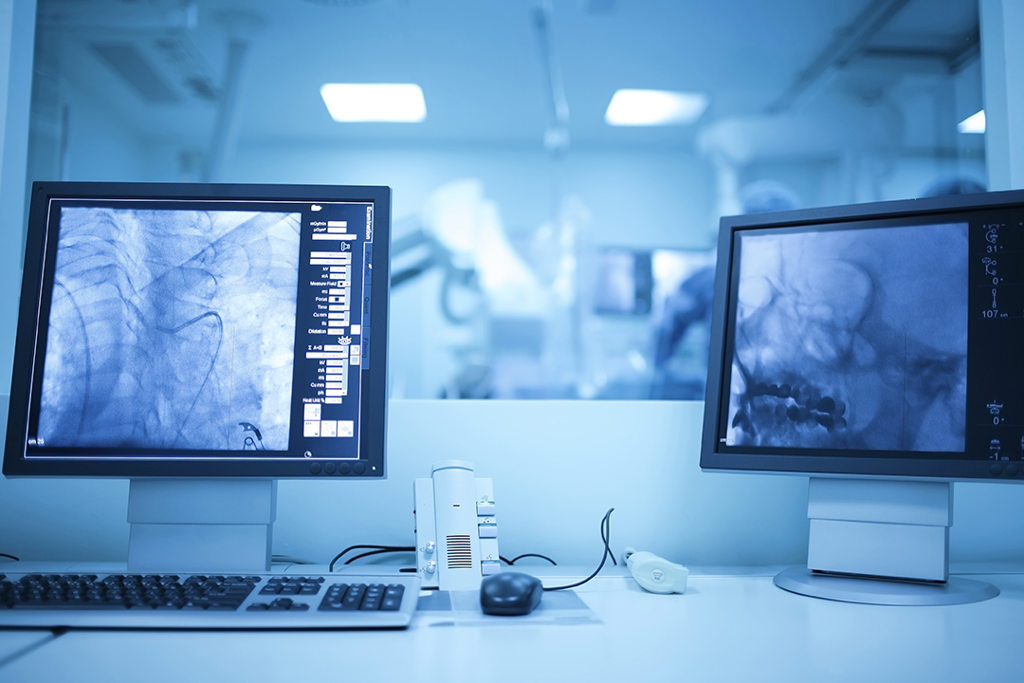
Cardiac Catheterization Helps Hearts Recover
If you are having heart problems or have had a heart attack, you may have been told you need a cardiac catheterization. Performed at Penn Highlands Heart Center’s Cardiac Catheterization Labs in DuBois, Huntingdon and Monongahela, your cardiologist will use this procedure to help determine if there are blockages in your arteries preventing blood flow to your heart. If blockages are found, your cardiologist also may clear them during the heart catheterization.
What is cardiac catheterization?
Cardiac catheterization is a minimally invasive procedure that lets Penn Highlands cardiologists get an up-close view of the arteries in and around your heart. To access the arteries, our heart doctors thread a small, hollow tube called a catheter, through a blood vessel that leads to your heart. They then inject a harmless contrast dye into the arteries through the catheter. This allows your cardiologist to use low-dose X-ray technology to identify areas of decreased blood flow due to narrowed or blocked arteries.
If a blockage is found, the cardiologist can perform a procedure called an angioplasty through the catheter at the time of the diagnostic catheterization. During an angioplasty, the cardiologist will thread a tiny balloon into the area of plaque buildup. Once in place, the balloon is inflated, which compresses the plaque and opens the artery to restore blood flow. Oftentimes, a stent -- a small mesh tube that acts as scaffolding – will be placed in the artery to keep it from collapsing after the plaque is removed.
Who needs a cardiac catheterization?
You might need a cardiac catheterization if your heart doctor suspects you have any blocked arteries, heart failure, or other types of heart disease. Symptoms that may indicate heart disease include chest pain, shortness of breath, dizziness, fatigue, and abnormal results from a screening exam, such as an electrocardiogram (ECG) or stress test.
Your heart doctor also may recommend cardiac catheterization if you have chest pain following a heart attack, heart bypass surgery, or prior cardiac catheterization.
What are the risks of cardiac catheterization?
Side effects and complications from cardiac catheterization are unlikely, but they can occur. The most common are:
- Bleeding, bruising, pain, or infection where the catheter is inserted into the body (usually the groin)
- Blood clot or blood vessel damage
- Heart rhythm problems
Serious complications are even more rare but can include:
- Sudden blockage of a coronary artery
- A tear in the lining of an artery
- Kidney damage from the contrast dye
You can reduce your risk of complications by choosing a cardiologist and hospital with extensive experience in cardiac catheterization, like Penn Highlands Healthcare. Penn Highlands cardiologists perform more than 2,500 heart catheterizations annually to diagnose problems patients may have with their heart muscles, valves, or coronary arteries. Problems with the heart can be serious, leading to heart attack, heart failure, or even death. Heart catheterization is a lifesaving procedure. Most patients who have it done go on to lead healthy, full lives with the assistance of cardiac rehabilitation.
Cardiac Catheterization at Penn Highlands
Penn Highlands cardiologists perform cardiac catheterizations at The Heart Center’s Cardiac Catheterization Lab in DuBois, Huntingdon and Monongahela.

Cardiac Device Specialist
Cardiology
Interventional Cardiology
DuBois Regional Cardiology Associates - St. MarysA Partnered Service with Penn Highlands Healthcare
DuBois Regional Cardiology Associates - DuBoisA Partnered Service with Penn Highlands Healthcare
DuBois Regional Cardiology Associates - PunxsutawneyA Partnered Service with Penn Highlands Healthcare

Cardiology
Interventional Cardiology
Non-Invasive Cardiology
DuBois Regional Cardiology Associates - St. MarysA Partnered Service with Penn Highlands Healthcare
DuBois Regional Cardiology Associates - DuBoisA Partnered Service with Penn Highlands Healthcare

Cardiology
Interventional Cardiology
Cardiology Associates of Altoona, LLP - AltoonaA Partnered Service with Penn Highlands Healthcare
Cardiology Associates of Altoona, LLP - HuntingdonA Partnered Service with Penn Highlands Healthcare

Cardiology
Interventional Cardiology
DuBois Regional Cardiology Associates - ClearfieldA Partnered Service with Penn Highlands Healthcare
DuBois Regional Cardiology Associates - DuBoisA Partnered Service with Penn Highlands Healthcare

Cardiology
Cardiology Associates of Altoona, LLP - HuntingdonA Partnered Service with Penn Highlands Healthcare

Cardiology
Cardiology Associates of Altoona, LLP - HuntingdonA Partnered Service with Penn Highlands Healthcare
Cardiology Associates of Altoona, LLP- TyroneA Partnered Service with Penn Highlands Healthcare

Cardiology
Cardiovascular/Thoracic Surgery
Internal Medicine
Interventional Pulmonology
Penn Highlands Cardiology - Punxsutawney
Penn Highlands Cardiology - Uniontown

Cardiology
Cardiovascular/Thoracic Surgery
Penn Highlands Cardiology - Monongahela

Cardiology
Cardiology Associates of Altoona, LLP - HuntingdonA Partnered Service with Penn Highlands Healthcare

Cardiology
Cardiology Associates of Altoona, LLP - HuntingdonA Partnered Service with Penn Highlands Healthcare
Cardiology Associates of Altoona, LLP- TyroneA Partnered Service with Penn Highlands Healthcare

Cardiology
Cardiology Associates of Altoona, LLP - HuntingdonA Partnered Service with Penn Highlands Healthcare
Cardiology Associates of Altoona, LLP- TyroneA Partnered Service with Penn Highlands Healthcare

Cardiology
Cardiology Associates of Altoona, LLP - AltoonaA Partnered Service with Penn Highlands Healthcare
Cardiology Associates of Altoona, LLP - HuntingdonA Partnered Service with Penn Highlands Healthcare

Cardiology
Cardiology Associates of Altoona, LLP - AltoonaA Partnered Service with Penn Highlands Healthcare
Cardiology Associates of Altoona, LLP - HuntingdonA Partnered Service with Penn Highlands Healthcare
A heart or cardiac catheterization is a minimally invasive, outpatient procedure that allows a cardiologist to effectively diagnose, and often treat, heart problems in patients who are suspected of having a blockage or other issues within the arteries.
Penn Highlands DuBois Cardiac Cath Lab is located on the fifth floor of the main hospital.
814-375-7700 phone
A heart or cardiac catheterization is a minimally invasive, outpatient procedure that allows a cardiologist to effectively diagnose, and often treat, heart problems in patients who are suspected of having a blockage or other issues within the arteries.
Penn Highlands Huntingdon Cardiac Cath Lab is located on the second floor of the hospital, in Suite 220.
814-643-8478 phone

